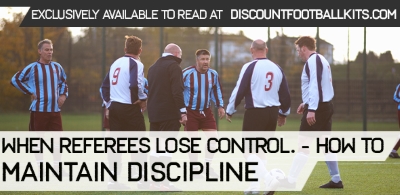There’s no doubt that being a referee can be a largely thankless task, with the emotive nature of the game meaning that officials often have to maintain control in the face of immense pressure and sustained abuse.
Some referees fail in this respect, of course. Most recently, an official in the Chilean Second Division slapped a player after delivering a red card, precipitating a riot and mass brawl.
Then there’s the curious case of former French referee Tony Chapron, who aimed a kick at Nantes player Diego Carlos in a Ligue 1 match after an innocent collision, before inexplicably sending the player off. He was subsequently banned from officiating for six months, before retiring as a ref and starting work for the French media.
But how can referees maintain control of themselves and the game they’re officiating? Let’s find out!
Demonstrate Confidence and Knowledge
In games at any level, players and managers like to influence referees and secure a competitive advantage.
However, this can cause players to push the boundaries of what’s acceptable, placing referees in a difficult position and making it harder for them to officiate as the match progresses.
To avoid this, the key is to maintain your confidence and authority from the outset, both in terms of your manner and your knowledge of the laws of the game.
This will deter players from attempting to take liberties during the game, while reaffirming that you’ll most likely crackdown on any bad behaviour.
Let the Game Flow (Where Possible)
Another advantage of having confidence in your knowledge of the rules is that this enables you to let games flow where possible, minimising the need for you to penalise players and raise frustrations on either side.
Of course, it’s important to apply the rules and discipline players in some instances, but you should always make use of common sense and try to minimise unnecessary stoppages through the course of the game.
Deploying the advantage rule can be particularly effective where possible, as this type of measure prevents players from getting frustrated over the course of the match.
This is a delicate balance to strike, of course, but it’s also one that holds the key to successful refereeing at all levels of football.
Maintain Your Physical Fitness
Ultimately, it’s mistakes from officials (which can alter the course of a game and ruin an entire season in some instances) that really cause discipline issues in-game, placing undue pressure on officials and players in the process.
So, you’ll need to take practical steps to avoid mistakes being made in the first place. One particularly effective measure is to maintain physical fitness, so that you can keep pace with the game and get the best possible view of the action as it unfolds.
This isn’t a guarantee of good officiating, of course, but it makes it easier to maintain control of a game and ensure that correct decisions are made most of the time.










